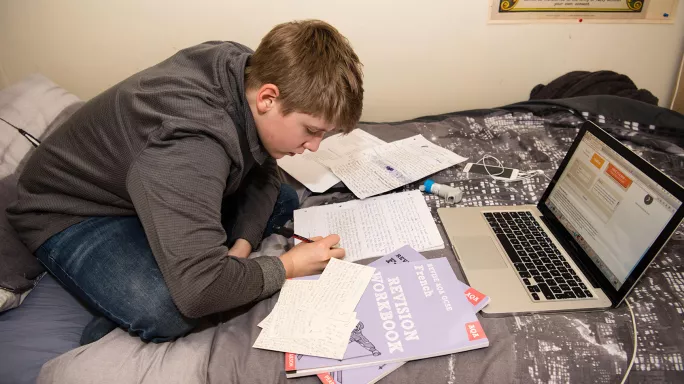- Home
- GCSEs: How building resilience leads to better results
GCSEs: How building resilience leads to better results

In the lead-up to the exams season, many schoolchildren struggle to cope with the increasing demands placed on them. Exams have always been stressful, but it is widely acknowledged that the new GCSEs are much tougher than the previous ones; this creates a pressure cooker in schools for both staff and students.
This high-pressure situation means that it is now more important than ever for teachers to improve students' resilience and give them the best chances of succeeding in a tough academic environment.
However, developing academic resilience has less to do with how a lesson is resourced and more to do with how the teacher works with individual students. This is why this area of work is often forgotten. Nevertheless, it has huge implications for the wellbeing of your students and their ability to perform well in your subject.
So how can teachers improve academic resilience? Here are some suggestions.
1. Build positive relationships
The most important thing a teacher can do is to develop positive relationships with their students. When students feel safe and valued in a classroom this helps to strengthen resilience. They must feel supported when they are struggling with a problem and safe to make mistakes, knowing that their teacher believes in them and that, even when they get things wrong, they can go back and give it another go.
This creates an environment where the process of learning is valued and, come GCSE time, students should be better equipped to tackle a challenging situation.
Quick read: GCSEs: Why SLOP is the (not so) secret step to success
Quick listen: GCSE revision: a guide to what works best
Want to know more? Dopamine: the ‘pleasure chemical’ that helps young people learn
2. Use problem-solving activities
Problem-solving activities can take many forms, such as problem/solution cards or "detective"-style investigations. What is important with these activities is giving students the opportunity to think independently about how to approach and tackle an unfamiliar scenario.
As the teacher, you need to provide structure and guidance to solve the problem, but then allow students to try out their own solutions and see the results for themselves. Over time, this builds up the students’ abilities to meet new challenges head-on; making use of the structures you provided and their past experience will allow students to withstand unfamiliar problems.
Although students might initially be uncomfortable with these activities, over time they will become much more engaged when approaching problems in lessons and, come exam time, will be less perturbed when a new problem presents itself.

3. Explaining answers
Regularly encourage students to not just give their answer, but also explain how they reached the answer they have given. This allows students to recognise that there is value not just in getting things right but also in working out how to tackle a challenge.
With this approach, the way in which the teacher handles incorrect answers is paramount. Teachers need to encourage a high-challenge, low-threat environment, which will allow students to be comfortable in getting things wrong.
Over time, this will translate into more students offering answers during questioning and an increased willingness to give everything a go. The skills developed through understanding the process of solving a problem and the removal of the fear associated with getting things wrong will lead to increased resilience and, hopefully, better exam performance.
4. Develop autonomy
Teachers can increase students’ autonomy by making sure that the focus of lessons is on mastering the subject and not on drawing comparisons between each student and their achievements. This ensures that the worth of a students’ work comes from them achieving what they set out to achieve, rather than gaining a competitive advantage over another student.
Target grades and levels can appear to stand in the way of this process, but if you make sure that each student has clear and achievable goals, this will allow them to work towards what you are expecting. In essence, this is good differentiation. Done well, students will feel the pride involved with reaching their goals, even if what they appear to have achieved is "less" than another student has.
This sense of achievement will ultimately lead to increased focus in lessons and to students becoming clearer about what they need to do to improve their work. And when the exams roll around, students will be more focused on doing their best than on trying to beat their peers.
Michael Power is a head of year
Further reading
Register with Tes and you can read two free articles every month plus you'll have access to our range of award-winning newsletters.
Keep reading with our special offer!
You’ve reached your limit of free articles this month.
- Unlimited access to all Tes magazine content
- Save your favourite articles and gift them to your colleagues
- Exclusive subscriber-only stories
- Over 200,000 archived articles
- Unlimited access to all Tes magazine content
- Save your favourite articles and gift them to your colleagues
- Exclusive subscriber-only stories
- Over 200,000 archived articles
